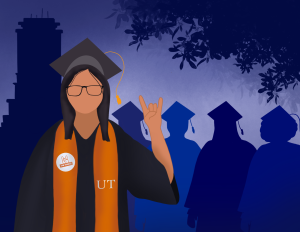Bolster Minority Centers at UT through Departmentalization
September 20, 2022
Historical narratives are erasable. My childhood was deeply rooted within the rich cultural heritage of the Viet, Chinese, Latinx and African communities in Houston. Nevertheless, discovering my identity was difficult. I struggled with my mother’s native tongue, blurred by my sexuality and constantly struggled with the idea of “fitting in.”
In high school, students are rarely taught the histories, stories and nuances of minority communities — powerful tools in advancing equity and recognizing historical challenges in America. While these courses are offered at the University, it’s also essential to recognize the imbalance between departments and centers, especially as UT continues to push diversity and inclusion efforts.
The University is actively pursuing a plan to promote diversity, equity and inclusion — from efforts to recruit diverse faculty to allocating funds for inclusive research. Minority centers such as the centers for Asian American Studies and Women’s and Gender Studies should be departmentalized in order to gain better funding and additional faculty.
The College of Liberal Arts has 25 departments and 11 centers. There is a department of Mexican American and Latina/o Studies, but only a Center for Asian American Studies. By streamlining this transition, centers would be eligible to fund graduate programs and additional research initiatives as well as expand outreach.
Christen Smith, Ph.D., the director of the Center for Women’s and Gender Studies, envisions departmentalization that includes a Ph.D. program and dedicated faculty members for the major.
“(Departmentalization) will allow us to be able to expand our undergraduate major, expand our degree majors, offer more courses, and resources to students.” Smith said.
Robust and well-funded departments produce academically productive students.
“The Center for Women’s and Gender Studies plays a critical role in the University’s mandate to expose different avenues and areas of research, and it doesn’t go nearly as far as it could if it was departmentalized,” said Isaiah Mosley, a Plan II and women’s and gender studies freshman.
These centers study and analyze complex identities, issues and historical aspects of humanities. The Women’s and Gender studies major includes an intersection of LGBTQ+ studies and feminist studies.
“Not being able to departmentalize does a disservice to advancing the field,” Mosley said.
Discovering personal identity comes with navigating college. Courses and resources offer an array of opportunities to learn about the histories, cultures and implications of a student’s background. These resources often foster social and academic growth, especially for those interested in diversifying their cultural perspectives.
“I’ve put a lot of focus on advocating for struggles and issues (for Asian Americans). … Being able to experience these (programs), collectively as an Asian American citizen is just a big part of me learning my place in the world and how I belong at the University as a student,” English freshman Trinity Ngo said.
Ngo initially hoped to pursue a double major in Asian American Studies and English but assumed that it was “only available as a minor or as a certificate.”
Naturally, departmentalization comes with obstacles.
“We have students taking courses right within the major and minors, but not enough to make that justification to the college,” said Mohit Mehta, senior administrative program coordinator for the Center for Asian American Studies.
However, Mehta is hopeful that the center will attract students through speaker series, course recruitment and the expanding interests of students. UT currently has the only Asian American studies major in the Southwest. Departmentalization is an avenue for the University to serve as a national model.
These 11 centers, especially those studying underrepresented communities, deserve to be departmentalized.
“Certain centers are hopeful,” Smith said. “We have the support of the Provost and the Dean. We are moving forward.”
Wan is an aerospace engineering and Plan II freshman from Houston, Texas.







